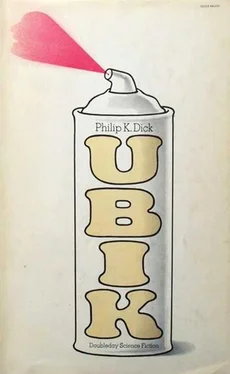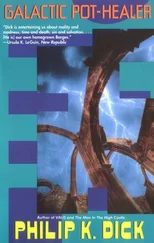However, he walked over to the LaSalle to examine it at close range. Maybe it’s mine, he said to himself; maybe one of my keys fits its ignition. Isn’t that how surface cars operated? On the other hand, how am I going to drive it? I don’t know how to pilot an oldtime automobile, especially one with—what did they call it?—manual transmission. He opened the door and slid onto the seat behind the driver’s steering wheel; there he sat, plucking aimlessly at his lower lip and trying to think the situation through.
Maybe I ought to drink down a tablespoon of Ubik liver and kidney balm, he said to himself grimly. With those ingredients it ought to kill me fairly thoroughly. But it did not strike him as the kind of death he could welcome. The cobalt chloride would do it, very slowly and agonizingly, unless the digitalis managed it first. And there were, of course, the oleander leaves. They could hardly be overlooked. The whole combination would melt his bones into jelly. Inch by inch.
Wait a minute, he thought. Air transportation existed in 1939. If I could get to the New York Airport—possibly in this car—I could charter a flight. Rent a Ford trimotor plane complete with pilot. That would get me to Des Moines.
He tried his various keys and at last found one which switched on the car’s ignition. The starter motor cranked away, and then the engine caught; with a healthy rumble the engine continued to turn over, and the sound of it pleased him. Like the genuine cowhide wallet, this particular regression struck him as an improvement; being completely silent, the transportation of his own time lacked this palpable touch of sturdy realism.
Now the clutch, he said to himself. Over on the left. With his foot he located it. Clutch down to the floor, then shift the lever into gear. He tried it—and obtained a horrid clashing noise, metal whirring against metal. Evidently, he had managed to let up on the clutch. He tried it again. This time he successfully got it into gear.
Lurching, the car moved forward; it bucked and shuddered but it moved. It limped erratically up the street, and he felt within him a certain measured renewal of optimism. And now let’s see if we can find the goddam airfield, he said to himself. Before it’s too late, before we’re back to the days of the Gnome rotary engine with its revolving outside cylinders and its castor-oil lubricant. Good for fifty miles of hedge-hopping flight at seventy-five miles per hour.
An hour later he arrived at the airfield, parked and surveyed the hangars, the windsock, the old biplanes with their huge wooden props. What a sight, he reflected. An indistinct page out of history. Recreated remnants of another millennium, lacking any connection with the familiar, real world. A phantasm that had drifted into sight only momentarily; this, too, would be gone soon: it would no more survive than had contemporary artifacts. The process of devolution would sweep this away like it had everything else.
He got shakily from the LaSalle—feeling acutely carsick—and trudged toward the main buildings of the airfield.
“What can I charter with this?” he asked, laying all his money out on the counter before the first official-looking person he caught sight of. “I want to get to Des Moines as quickly as possible. I want to take off right away.”
The field official, bald-headed, with a waxed mustache and small, round, gold-rimmed eyeglasses, inspected the bills silently. “Hey, Sam,” he called with a turn of his apple-like round head. “Come here and look at this money.”
A second individual, wearing a striped shirt with billowing sleeves, shiny seersucker trousers and canvas shoes, stumped over. “Fake money,” he said after he had taken his look. “Play money. Not George Washington and not Alexander Hamilton.” Both officials scrutinized Joe.
Joe said, “I have a ’39 LaSalle parked in the parking lot. I’ll trade it for a one-way flight to Des Moines on any plane that’ll get me there. Does that interest you?”
Presently the official with the little gold-rimmed glasses said meditatively, “Maybe Oggie Brent would be interested.”
“Brent?” the official in the seersucker pants said, raising his eyebrows. “You mean that Jenny of his? That plane’s over twenty years old. It wouldn’t get to Philadelphia.”
“How about McGee?”
“Sure, but he’s in Newark.”
“Then, maybe Sandy Jespersen. That Curtiss-Wright of his would make it to Iowa. Sooner or later.” To Joe the official said, “Go out by hangar three and look for a red and white Curtiss biplane. You’ll see a little short guy, sort of fat, fiddling around with it. If he don’t take you up on it nobody here will, unless you want to wait till tomorrow for Ike McGee to come back here in his Fokker trimotor.”
“Thanks,” Joe said, and left the building. He strode rapidly toward hangar three, already seeing what looked like a red and white Curtiss-Wright biplane. At least I won’t be making the trip in a World War JN training plane, he said to himself. And then he thought, How did I know that “Jenny” is a nickname for a JN trainer? Good god, he thought. Elements of this period appear to be developing corresponding coordinates in my mind. No wonder I was able to drive the LaSalle; I’m beginning to phase mentally with this time-continuum in earnest!
A short fat man with red hair puttered with an oily rag at the wheels of his biplane; he glanced up as Joe approached.
“Are you Mr. Jespersen?” Joe asked.
“That’s right.” The man surveyed him, obviously mystified by Joe’s clothes, which had not reverted. “What can I do for you?” Joe told him.
“You want to trade a LaSalle, a new LaSalle, for a one-way trip to Des Moines?” Jespersen cogitated, his brows knitting. “Might as well be both ways; I got to fly back here anyway. Okay, I’ll take a look at it. But I’m not promising anything; I haven’t made up my mind.”
Together they made their way to the parking lot.
“I don’t see any ’39 LaSalle,” Jespersen said suspiciously.
The man was right. The LaSalle had disappeared. In its place Joe saw a fabric-top Ford coupe, a tinny and small car, very old, 1929, he guessed. A black 1929 Model-A Ford. Nearly worthless; he could tell that from Jespersen’s expression.
Obviously, it was now hopeless. He would never get to Des Moines. And, as Runciter had pointed out in his TV commercial, this meant death—the same death that had overtaken Wendy and Al.
It would be only a matter of time.
Better, he thought, to die another way. Ubik , he thought. He opened the door of his Ford and got in.
There, on the seat beside him, rested the bottle which he had received in the mail. He picked it up—
And discovered something which did not really surprise him. The bottle, like the car, had again regressed. Seamless and flat, with scratch marks on it, the kind of bottle made in a wooden mold. Very old indeed; the cap appeared to be handmade, a soft tin screw-type dating from the late nineteenth century. The label, too, had changed; holding the bottle up, he read the words printed on it.
ELIXIR OF UBIQUE. GUARANTEED TO RESTORE LOST MANLINESS AND TO BANISH VAPORS OF ALL KNOWN KINDS AS WELL AS TO RELIEVE REPRODUCTIVE COMPLAINTS IN BOTH MEN AND WOMEN. A BENEFICENT AID TO MANKIND WHEN SEDULOUSLY EMPLOYED AS INDICATED.
And, in smaller type, a further inscription; he had to squint in order to read the smudged, minute script.
Don’t do it, Joe. There’s another way.
Keep trying. You’ll find it. Lots of luck.
Runciter , he realized. Still playing his sadistic cat-and-mouse games with us. Goading us into keeping going a little longer. Delaying the end as long as possible. God knows why. Maybe, he thought, Runciter enjoys our torment. But that isn’t like him; that’s not the Glen Runciter I knew.
Читать дальше








